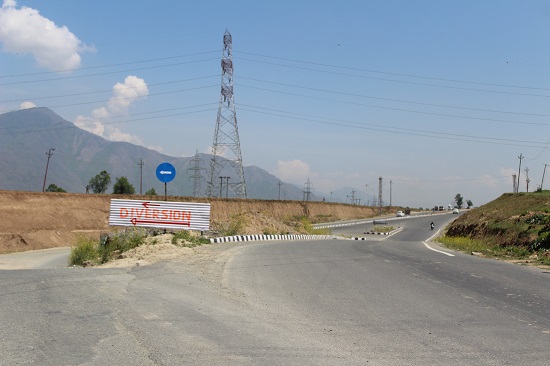
Two months after the suicide attack in Pulwama on a CRPF convoy that killed 40 paramilitary soldiers, Jammu and Kashmir Governor Satya Pal Malik, issued an unusual order banning civilian traffic on the J&K highway on every Sunday and Wednesday until May 31, citing security concerns as the reason to restrict civilian traffic. “Keeping in view the large movement of security forces on the national highway during the Parliamentary elections and associated possibility of any Fidayeen attack on security forces’ convoys, the state government has notified specified days in a week for the movement of security forces from Srinagar to Jammu,” said a Government Communiqué.
In order to understand the implications of this order it is necessary to get an idea about J&K highway. While the stretch from Udhampur to the Banihal Tunnel is mostly double lane, the highway widens after it emerges in the Valley, splitting into four lanes from Qazigund in South Kashmir to Narbal in Srinagar. After Narbal, the highway once again narrows to two lanes till Baramula. As the highway is the only stretch of road that connects Kashmir Valley to the outside world, the order restricting civil traffic twice a week is bound to cause heavy disruption in the day-to-day lives of Kashmiris. Those particularly affected will be medical patients, school children, businessmen, government employees, farmers and orchardists as well as drivers of public transport.
The restriction on movement of civilian traffic will add to problems already being faced by commuters due to the frequent closure of this highway on account of landslides and bad weather, which has forced adoption of a one-way traffic system for commercial vehicles. Since J&K is heavily dependent on supply of essential commodities from outside the state, the J&K highway becomes its lifeline and disruptions in vehicular traffic leads to scarcity of various items which in turn leads to hoarding by unscrupulous people that result in prices shooting up phenomenally. This leads to widespread dissatisfaction and can create a crisis, with people taking to the streets in protest. Srinagar has an airport but using the air mode to trans-ship goods and commodities is not only economically unviable but is also far beyond the handling capacity of this airport.
Since Kashmir Valley is a popular tourist destination, restrictions on civilian traffic will adversely affect the already tottering tourism industry. Similarly, this order will also disrupt the smooth movement of fruit laden trucks from Srinagar during the crucial period of April and May. Due to this, those associated with the horticulture sector will also suffer due to the impact on movement of fruits and vegetables which are perishable items.
The army has not yet commented on this issue but former Army Chief Gen VS Malik’s tweet slamming it as a “dumb idea” since it “…goes against the core object of winning hearts and minds” and “..shows forces becoming over defensive” seems to be in tune with the sentiments of the army. Gen Malik is not the lone army man who has criticised this move; even former Army Chief Gen VK Singh who is part of the government has voiced his reservations and so has ex-Northern Army Commander Lt Gen DS Hooda. Gen Malik’s suggestion that there is a need to strengthen the local police, intelligence setup and improving the security during troop movement reflects the positivity that exists in the mindset of security forces and central government needs to take serious notice of this.
Facing criticism for closing down the national highway connecting Jammu with Srinagar, the Union Home Ministry took refuge in statistics to claim the ban was for only 15% of total weekly hours. Underlining that the ban became necessary in the backdrop of the Pulwama attack, it has clarified that the step is a temporary measure that has been taken for ensuring safe movement of forces till May 31.
Political parties in J&K, including the Peoples Democratic Party (PDP) and the J&K Peoples Movement, approached the High Court on State Home Department’s order to restrict civilian traffic twice a week on the national highway. The High Court issued a notice to the union ministries of home and defence and the state government to furnish a reply by April 19 to the petitions challenging the traffic order as it was in violation of fundamental rights of the people. Kashmir’s business body has called for immediate revocation of the government order banning movement of civilian traffic on the highway. They said the order does not augur well for a democratic set-up and has been rightly condemned by all stakeholders. Since this ban comes in the wake of Lok Sabha polls in which the main thrust of J&K politics remains fixated on Centre-State relations, it is bound to influence elections results in Kashmir valley.
The logic of taking no chances in the run-up to the elections is well understood, the decision, however, should have been taken after weighing all pros and cons. It seems here that price that is likely to be paid for the move is too high in comparison to what will be gained. The movement of troops has been a regular feature in J&K over the last 30 years but never before has such a measure been imposed. Even in the 1990s when militancy was far more entrenched and more widespread no routine restrictions on movement of civil traffic on J&K highway was ever imposed.
It is well within the authority of the government to have a rethink on the order. Consultation with the Army by Home Ministry would be of some value since the forces seem to be confident of meeting whatever challenge the militants would pose in this crucial period. Rescinding the order may be a good idea for the government.
